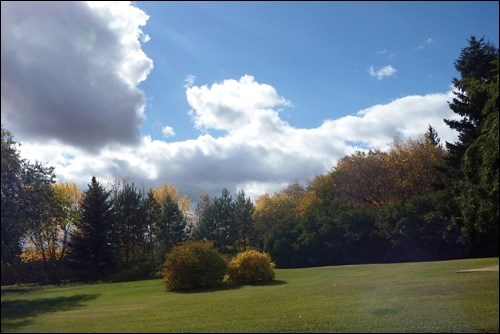This has been the summer of my discontent. For 60 long years I have worked as an arborist. Now I am watching my friends in the urban forest signalling the end of summer. Green ash trees, once the standard boulevard tree but now threatened by the Emerald Birch Borer, an accidental import from China, are the most individualistic. They have personalities. Although wise trees that leaf out late and drop their leaves early, some are still stubbornly green while others are leafless skeletons. American elms, still isolated from Dutch Elm Tree Disease, remain healthy and green, as are lindens and bur oaks. Ninety-year-old Russian poplars are losing their masses of yellow leaves. There are few weeping birches to see. Most of these beautiful trees have been killed by Bronze Birch Borers. I have mourned their loss.
I am too old now to perform surgery to repair wind damage in older trees. Winds have been violent this season and large branches have often blocked the streets. All I am able to do is to shape the small trees that have grown rapidly and without restraint. They are like wayward children that must be disciplined.
In the coming winter mule deer will visit to munch on cedars and cotoneaster hedges. After completing my fall cleanup I must put up chicken wire barriers to deter them.
This summer gardens flourished with little or no irrigation. Mosquitoes flourished as well, breeding in every hollow where rainwater pooled. In my garden there are still masses of flowers on elongated stems. The tops of root crops were elongated as well and the corn was higher than an elephant’s eye. It is still impossible to enjoy the view or to breath in the perfume that envelops the sweet pea trellises. Mild frosts have not killed the mosquitoes and they are as vicious as ever. I will put away my treasured Roughrider lawn chair today. I may have sat in it for all of six minutes this summer.
In a small town the residents are always aware of the frustrations of farmers. This year there was too much rain. Day after day, there was the roar of spray planes attempting to save the lentil crop from fungus infection. Harvest of all crops is still incomplete. Some will be bounteous and of good quality but most will have been damaged by excess moisture.
As the records show, there has not been a summer like this in Saskatchewan since 1916. Then, railway branch lines were important. They carried everything in and everything out of rural Saskatchewan. There were road allowances, but most roads were still trails. Where roadways were built up, they were rarely gravelled. Farmers faced with travelling to the nearest railway town for supplies or to deliver cream or loose hay for baling were frustrated by mud and washed-out ferry landings. Cream turned sour and hay rotted in the fields.
There is a better road system now but a poorer railway network. When I was a boy, farmers were still growing the crops they tried to grow in 1916. I could recognize wheat, barley oats and flax. I don’t know what grows in many fields now nor the purposes of machines I am seeing. I do know farmers and ranchers make a tremendous investment of money and themselves every year to produce food. They gamble with the weather gods and the commodity markets.
Sometimes city newspapers print articles bemoaning the fate of small towns and even suggesting, out of vast ignorance, ways in which they might survive. I sense smugness in their opinions. I know I can survive without artists, singers, professional sports, bartenders, fashionable boutiques and a host of other non-essential enterprises. I can’t survive without food. Neither can cities.



